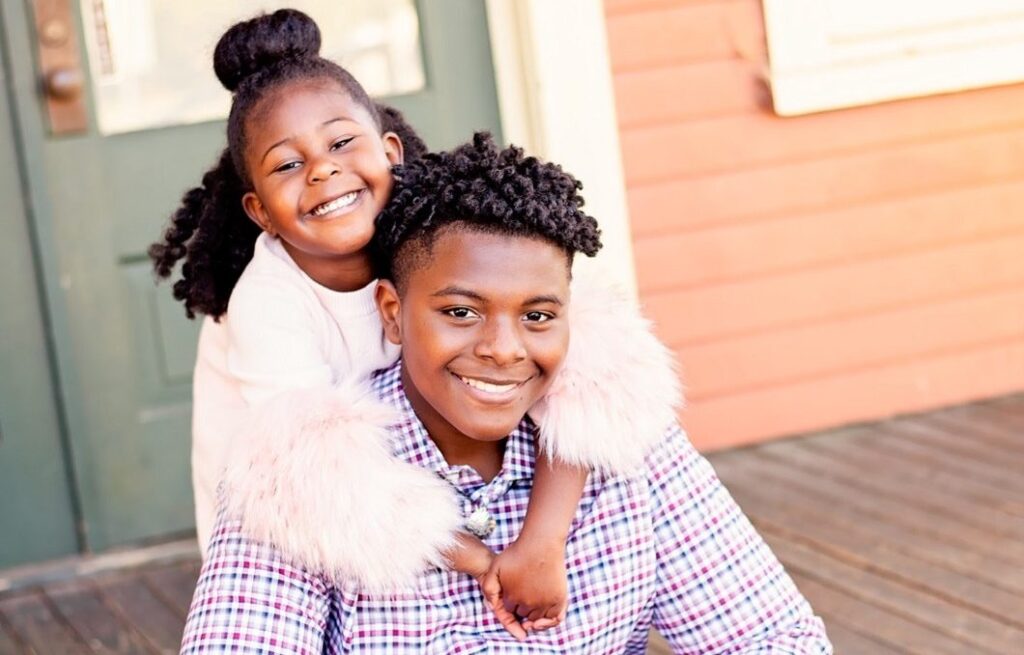I’ve been a mother for 14 years. I have a teenage son and a young daughter. Being a mother is a great honor that brings an indescribable joy. I marvel daily at the ways my children are growing and developing. I am also humbled at how parenting has made me a better human being. At night, I often gaze at my two precious children sleeping and am filled with gratitude and warmth.
But being a Black mother is also a heavy mental load. At times, it is both physically and emotionally exhausting. My need to protect my children from all types of dehumanizing attitudes and actions in the world around them takes a toll. I feel the stress in my jaw when I get angry over an unjust situation and then realize I’ve been clenching my teeth. My neck and shoulders tighten as I worry about their well-being when they’re out with friends, and realize I’m unable to truly relax until I hear them come in the door. My heart aches and my eyes sting from holding back tears when we discuss an injustice carried out against a child who looks like them.
Having “the talk” in households of color isn’t just that discussion about sex. It’s also the talk about what to do when someone calls you a racial slur. Or what to say when a teacher tells you they don’t expect you to do well in their class. Or how to respond when someone disrespects you by touching your hair, your clothing, or your body because it’s “different.” Or how to behave in the mall so you don’t get accused of stealing. Or how to engage with police officers so you make it home safely. These are talks I wish I didn’t have to give, but they are necessary to keep my children safe.
Every day, I look at my precious son, who now towers over me, as he gets up and prepares for school. I pray that his mind and spirit are well as he faces each new day. I think about how the opportunities to thrive for boys and young men of color are obstructed by the day-to-day indignities they face in our society. The historical treatment of people of color, and the current laws, practices, and social conditions in communities in the United States continually send a message that it is okay to degrade, shame, and devalue our boys and young men.
The weight of these messages, and the trauma it creates, is a heavier burden than a boy should have to bear. The work of humanizing the injured heart and mind of a boy of color happens through protection, connection, affection, direction, and correction, as coined by my friend and colleague, Dr. Howard Stevenson. So, as a fiercely determined mother to a boy in this predicament, I work daily to liberate him from the weight of this load.
I protect his heart and his mind by affirming him each day. I call him “scholar,” and “prince,” and “world-changer.” I protect him by offering a counter-narrative to the harsh characterization of his people, and giving him the knowledge of his ancestral history that reveals the legacy and power that lives within him. I protect him by connecting him to media that tells positive stories about boys like him. I send him stories of triumph and tenacity to invalidate the oppressive stories of hate.
“I protect him by offering a counter-narrative to the harsh characterization of his people, and giving him the knowledge of his ancestral history that reveals the legacy and power that lives within him.”
I connect him to the rich history of his immediate and extended family — the men who came before him and worked tirelessly as laborers, entrepreneurs, pharmacists, teachers, chefs, and nurses. I connect him to a tight-knit circle of friends who are like family that we have created to be a part of our village. I connect him to community institutions that pour into him — our church, his martial arts master, his basketball coach.
I pour affection onto him like running water. Even when we are in disagreement, I want him to feel love in my words. It sets the tone for his day when the first words he hears before he leaves our home are words of love and positivity. I also shower him with physical affection. Even as a teen, he still accepts my wet cheek kisses and warm hugs. That affection beats back the harshness of the world around him. Proximity and touch do wonders for the heart.
“Affection beats back the harshness of the world around him. Proximity and touch do wonders for the heart.”
I direct him by listening to his dreams, and pushing him to develop the skills to support the fulfillment of those dreams. I point out for him abilities that he may not recognize yet in himself, and I encourage him to build on them. I direct him by helping him to conceive how seemingly disparate skills come together to form a vision for his life that is fulfilling and rich.
I have high expectations for his behavior, his treatment of others, his honoring of elders, his respect for women, and his work ethic. I correct him when he falls short, and I hold him accountable. I want him to understand what it means to walk strongly in his manhood — with a sense of purpose, responsibility, and grace. I correct to foster understanding and changed behavior. This requires a lot of conversations, examples, and sharing of my own missteps in life.
“This is how I show my love. To liberate his mind from the chains of dehumanization that threaten to drag him down when he wants to soar.”
This is how I show my love. To liberate his mind from the chains of dehumanization that threaten to drag him down when he wants to soar. To transcend the negativity, and instill a hope that stirs up in him the strength to thrive. I don’t always get it right. And, I don’t do it alone. I am held up by the power of the ancestors, my own mother, his fathers, and the village that wraps its loving protection around us. This is my child, and I see this as my charge as a Black mother. And to all the mothers of beautiful boys of color who embrace this as their duty, I see you, sis. I see you.
A mother’s love liberates.




